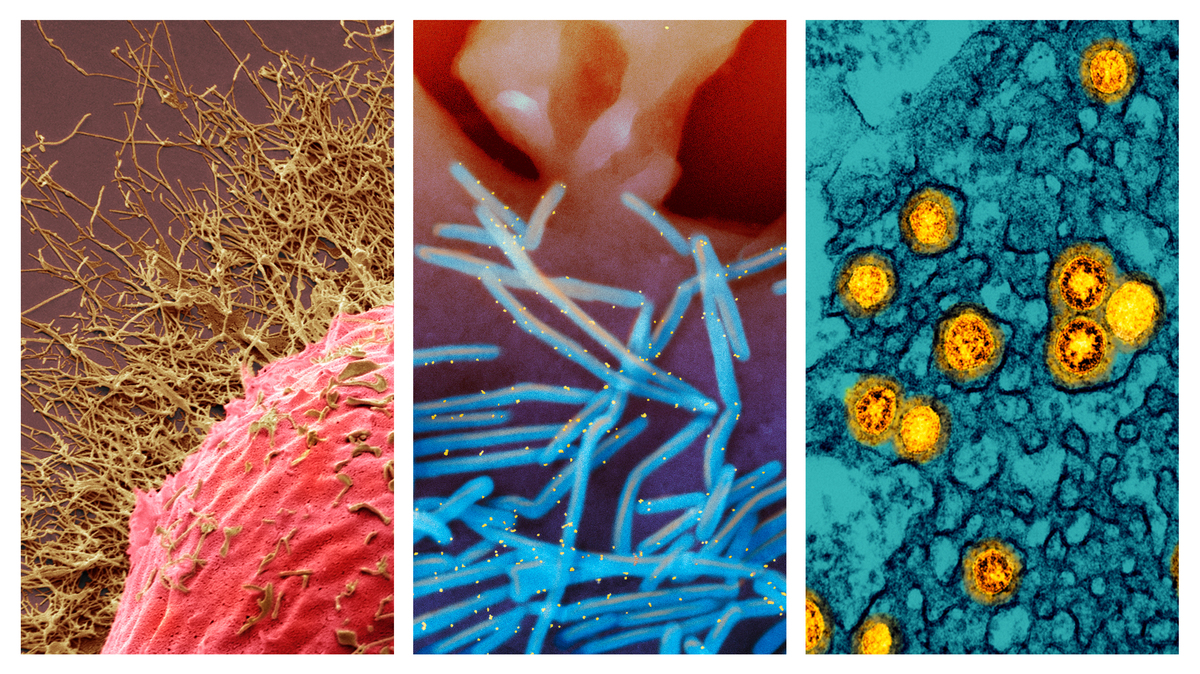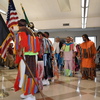
[ad_1]

From left: 1) Colored scanning electron micrograph (SEM) of a human cell contaminated with H3N2 flu virus (gold filamentous particles). 2) Scanning electron micrograph of human respiratory syncytial virus (RSV) virions (colorized blue) which can be shedding from the floor of human lung epithelial cells. 3) Transmission electron micrograph of SARS-CoV-2 Omicron virus particles (gold).
Science Source/ NIAID
cover caption
toggle caption

From left: 1) Colored scanning electron micrograph (SEM) of a human cell contaminated with H3N2 flu virus (gold filamentous particles). 2) Scanning electron micrograph of human respiratory syncytial virus (RSV) virions (colorized blue) which can be shedding from the floor of human lung epithelial cells. 3) Transmission electron micrograph of SARS-CoV-2 Omicron virus particles (gold).
For every of the final two years, Thanksgiving helped usher in some very unwelcome friends: Devastating waves of COVID-19.
No one thinks this 12 months might be something just like the final two darkish pandemic winters, at the very least relating to COVID-19. But the nation is now coping with a special type of menace — an unpredictable confluence of previous and new respiratory pathogens.
“We’re facing an onslaught of three viruses — COVID, RSV and influenza. All simultaneously,” says Dr. William Schaffner, an infectious illness specialist at Vanderbilt University. “We’re calling this a tripledemic.”
Flu and RSV are again, huge time
The respiratory syncytial virus (RSV) started surging unseasonably early this 12 months, infecting infants and younger kids who had little or no immunity to that virus, which wasn’t circulating all that a lot over the previous two years, partially, due to COVID-19 precautions.
The RSV resurgence continues to be flooding pediatric emergency rooms and intensive care units throughout the nation. Some mother and father are being compelled to attend greater than eight hours in emergency rooms for therapy for his or her very sick youngsters.
“Intensive care units are at or above capacity in every children’s hospital in the United States right now,” says Amy Knight, president of the Children’s Hospital Association. “It’s very, very scary for parents.”
At the identical time, an unusually early and extreme flu season is surging, dominated by the H3N2 pressure, which frequently strikes youngsters and older folks particularly exhausting.
“Influenza has hit the southeastern United States. It’s moved into the Southwest. It’s going up the East Coast and into the Midwest with some ferocity,” Schaffner says.
From coast to coast, hospitalizations for the flu are on the highest stage for this time of 12 months in a decade, according to the Centers for Disease Control and Prevention.
“Flu activity is high right now and continuing to increase,” says Lynnette Brammer, an epidemiologist within the CDC’s influenza division. “The good news is, the vaccines this year are well–matched to the viruses that are currently circulating, and there is still time to get vaccinated.”
But now comes one other Thanksgiving.
“These holiday celebrations with all their travel and their close contact usually function as virus accelerators,” Schaffner says. “We’re spending a lot of time with each other. We’re laughing and breathing deeply. And that’s an ideal environment for these respiratory viruses to spread to others.”
What will COVID do that time?
Of course, COVID-19 continues to be sickening tens of hundreds and killing tons of of individuals daily. And new, much more contagious omicron subvariants which can be particularly adept at infecting folks — even when they have been vaccinated or beforehand contaminated — are taking over.
“There’s a lot of moving parts here,” says Dr. David Rubin, who’s been monitoring the pandemic on the PolicyLab on the Children’s Hospital of Philadelphia.
“What is this all going to mean for COVID? Are we going to see a January/February resurgence of COVID that’s going to be fairly significant? That may yet be coming.”
Many infectious illness specialists say the immunity folks have from vaccinations and infections ought to maintain any new surge of COVID-19 infections from inflicting a giant improve in hospitalizations and deaths.
“I’m hopeful, given where we are with COVID, that we’re not looking at something like last winter. But at the end of the day, Mother Nature gets the final word on these things,” Dr. Ashish Jha, the White House COVID-19 Coordinator, instructed NPR.
“We’re in new territory here” with three viruses all circulating at excessive ranges simutaneously, he says.
“I think it’s a really worrisome situation looking to the weeks coming ahead,” says Jennifer Nuzzo, an epidemiologist who runs the Pandemic Center at Brown University.
Nuzzo’s apprehensive as a result of an exhausted nation has deserted most of the precautions folks have been taking to guard themselves and others. Flu vaccination charges are down by about 10% to fifteen% from earlier years. Only about 11% of these eligible for the brand new bivalent omicron boosters have gotten boosted.
“We can’t just resign ourselves to assuming that it’s going to happen no matter what,” she says. “We can very much take action to prevent a rise in hospitalizations and deaths.”
Nuzzo and others specialists say Americans can get vaccinated and boosted, particularly if they’re at excessive threat due to their age or different well being issues.
People ought to take into account Zooming for Thanksgiving in the event that they’re sick, testing for COVID-19 earlier than gatherings (particularly these involving older mates and family and different weak folks), and even take into account placing that masks again on as a lot as attainable.
“If you’re not eating or drinking it’s probably a smart idea to protect the immunocompromised, the infants, as well as the older individuals in the household,” says Dr. Tina Tan, an infectious illness specialist on the Northwestern University Feinberg School of Medicine.
There are hints that RSV might already be peaking, and the flu might additionally peak early, earlier than any new COVID-19 surge emerges. That would assist relieve at the very least a number of the stress on hospitals.
There’s even a theoretical chance that the flu and RSV might blunt any new COVID-19 surge in the identical means the coronavirus crowded out these viruses the final two years. One chance is a phenomenon often known as “viral interference,” which includes the presence of 1 virus lowering the danger of catching one other.
“COVID could be outcompeted, which is potentially good news,” Rubin says.
[adinserter block=”4″]
[ad_2]
Source link


